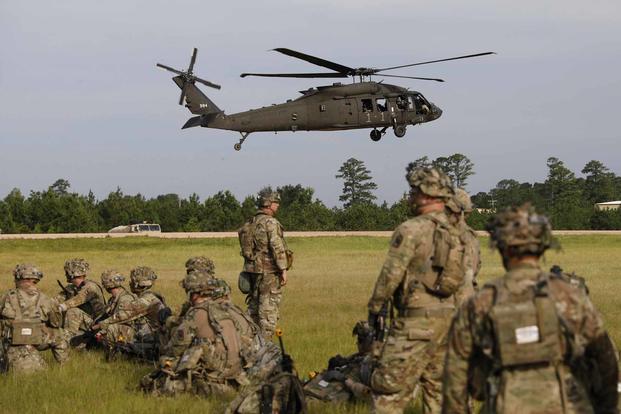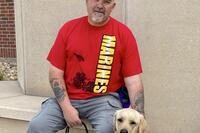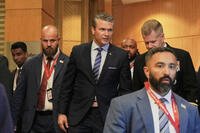At least 115 soldiers have tested positive for COVID-19 during a critical National Guard training exercise this month, Military.com has learned.
The Arkansas Guard's 39th Infantry Brigade Combat Team has been training at the Joint Readiness Training Center, or JRTC, at Fort Polk, Louisiana, since early July, and the training will last for about another week. Soldiers are mostly in the field, and the events are built to mimic austere conditions to prepare for combat abroad. COVID-19 has run rampant, and leaders warn there is little they can do to mitigate risk in the field as they push for soldiers to get vaccinated.
"I tried to show leadership by getting the vaccine and encouraging my soldiers to get it," Lt. Col. Anthony Sevier, commander of the 2nd Battalion, 153rd Infantry Regiment, told Military.com.
Read Next: Congress Rebuffs Air Force's Plan to Retire Older Aircraft, Putting A-10 Move on Hold
The Arkansas Guard makes up the bulk of the infections, according to a Guard spokesperson. But a few of the cases involve personnel at Fort Polk and other units who are facilitating the training.
The news comes after the Navy announced two sailors died of COVID-19 in the past week. Some military leaders are cracking down as the contagious Delta variant sweeps through unvaccinated populations. On Wednesday, Fort Stewart, Georgia, announced a return to a mask mandate for troops inside buildings on and off base.
Yet, no guardsmen at Fort Polk have been hospitalized from coronavirus infections, according to the Guard spokesperson. At least nine buildings are set up for soldiers who are sick or for those awaiting test results to quarantine. A lab on base can get results within a few hours, and vaccinations are readily available for soldiers who want them.
About 35% of the Arkansas population is fully vaccinated, one of the lowest rates in the country, according to the Centers for Disease Control and Prevention. As of Wednesday, nearly 57% of the U.S. is fully vaccinated.
In Arkansas, the virus is spreading rapidly with more than 11,000 cases in the past week, according to CDC data.
Despite there not being any clear health consequences for troops who have been sickened by the coronavirus, Sevier said training has been impacted.
"It can take a squad out," he stressed, referencing a COVID-19 infection. "The issues and the impacts are when you have a certain number of people and one of them is positive, I have to go into contact tracing, and I lose those soldiers for a certain amount of time."
Sevier said he urges other commanders planning to take their soldiers out into the field to take the pandemic "seriously" and to "follow guidelines" set by the CDC.
JRTC is one of the Army's premier training grounds and usually involves about a month of combat training, with multiple events tied to a strict schedule. Only a handful of units get to rotate through in a year, so time at JRTC is viewed by commanders as precious.
Cpt. Paul Bowen, commander of "Chaos" Company, 2nd Battalion, 153rd Infantry, said given the reality of the training on the ground, there is not much to be done about mitigating the risk of infection beyond mandating troops who are not vaccinated to wear masks. But when infections are suspected, the unit needs to act quickly to remove that soldier and everyone else who may have been close to them, Bowen said. That can be difficult to figure out, given large groups of soldiers are working together all day during the weeks-long training.
"The biggest thing with us being infantry is, we're outside most of the time, but anytime we're in the back of a [truck] or in a tent, we're wearing face covers," he said. "It has had an impact, and when you have a positive [test result], you're quarantining those individuals."
With losing soldiers to quarantine, Bowen said it has taken leaders out of crucial training events, which can impact carefully planned operations.
"Sometimes you run a [mission] without a key leader like a platoon leader or platoon sergeant," he added.
It is unclear how many guardsmen are vaccinated. Data obtained by Military.com shows only 30% of the force is fully vaccinated. Yet that data is likely inaccurate, given many troops are seeking vaccines at civilian clinics and the Department of Veterans Affairs, which is not tracked by the Guard.
The Defense Department still does not have a mandate for troops to receive the vaccine. Defense Secretary Lloyd Austin said two weeks ago that 70% of the active-duty force, across all branches, have received at least one dose.
Yet governors have the authority to require that guardsmen receive vaccines.
On Monday, Gov. Gavin Newsom announced California will mandate that all state employees, including the Guard, be vaccinated or face weekly testing. Guardsmen in the state are the first set of troops to face a mandate for the shots. However, it is unclear how commanders will enforce testing since guardsmen typically train once a month.
President Joe Biden is considering a vaccine mandate for all federal employees, which the VA enacted for many of its health-care workers.
"That's under consideration right now," Biden told reporters Tuesday. "If you're not vaccinated, you're not nearly as smart as I thought you were."
-- Steve Beynon can be reached at Steve.Beynon@military.com. Follow him on Twitter @StevenBeynon.
Related: Many Soldiers Still Aren't Vaccinated; What's The Army's Plan?














